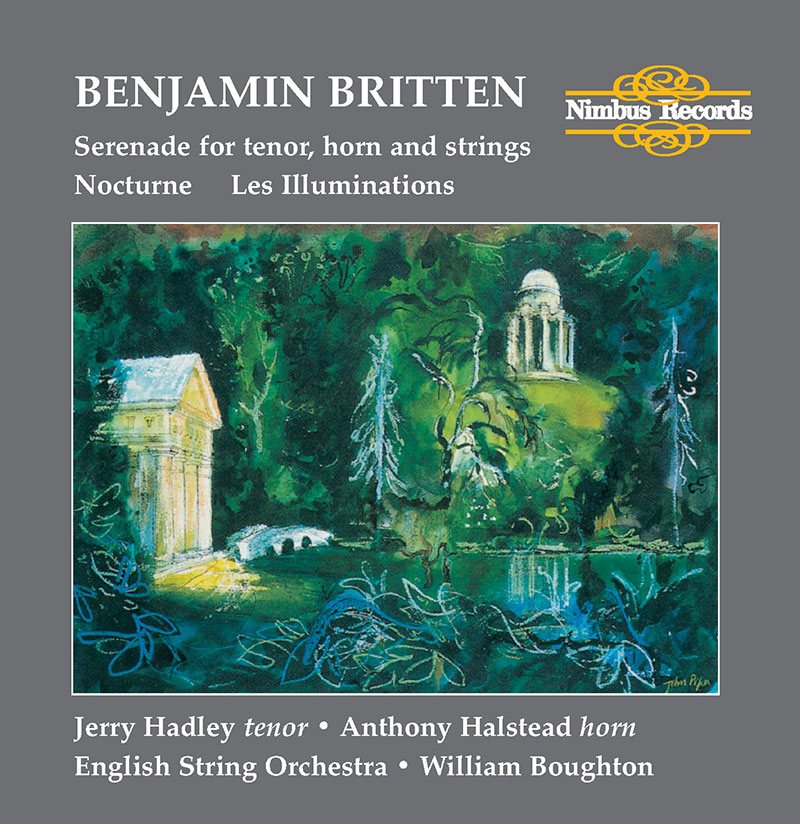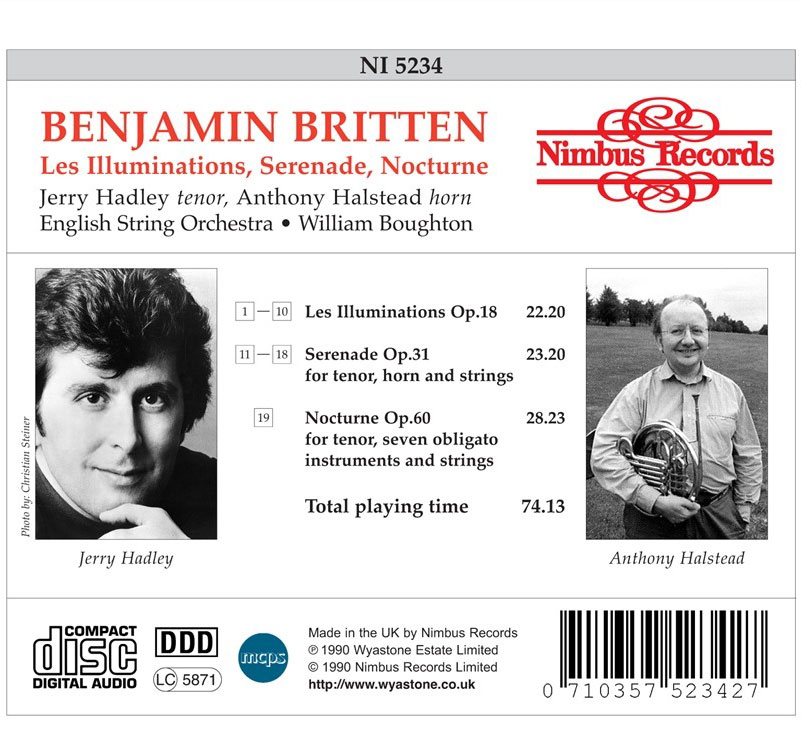Logowanie
Dlaczego wszystkjie inne nie brzmią tak jak te?
Chai Lang, Fan Tao, Broadcasting Chinese Orchestra
Illusive Butterfly
Butterly - motyl - to sekret i tajemnica muzyki chińskiej.
SpeakersCorner - OSTATNIE!!!!
RAVEL, DEBUSSY, Paul Paray, Detroit Symphony Orchestra
Prelude a l'Apres-midi d'un faune / Petite Suite / Valses nobles et sentimentales / Le Tombeau de Couperin
Samozapłon gwarantowany - Himalaje sztuki audiofilskiej
PROKOFIEV, Stanislaw Skrowaczewski, Minneapolis Symphony Orchestra
Romeo and Juliet
Stanisław Skrowaczewski,
✟ 22-02-2017
BARTOK, Antal Dorati, Philharmonia Hungarica
Dance Suite / Two Portraits / Two Excerpts From 'Mikrokosmos'
Samozapłon gwarantowany - Himalaje sztuki audiofilskiej
ENESCU, LISZT, Antal Dorati, The London Symphony Orchestra
Two Roumanian Rhapsodies / Hungarian Rhapsody Nos. 2 & 3
Samozapłon gwarantowany - Himalaje sztuki audiofilskiej
Winylowy niezbędnik
ClearAudio
Cartridge Alignment Gauge - uniwersalny przyrząd do ustawiania geometrii wkładki i ramienia
Jedyny na rynku, tak wszechstronny i właściwy do każdego typu gramofonu!
ClearAudio
Harmo-nicer - nie tylko mata gramofonowa
Najlepsze rozwiązania leżą tuż obok
IDEALNA MATA ANTYPOŚLIZGOWA I ANTYWIBRACYJNA.
Wzorcowe
Carmen Gomes
Celebrating the art and spirit of music - vol. 5 - Reference Songs
- CHCECIE TO WIERZCIE, CHCECIE - NIE WIERZCIE, ALE TO NIE JEST ZŁUDZENIE!!!
Petra Rosa, Eddie C.
Celebrating the art and spirit of music - vol. 3 - Pure
warm sophisticated voice...
SAMPLER - STS DIGITAL, Gregor Hamilton
Celebrating the art and spirit of music - vol. 2 - Love songs from Gregor Hamilton
...jak opanować serca bicie?...
SAMPLER - STS DIGITAL
Celebrating the art and spirit of music - vol. 1 - Leonardo Amuedo
Największy romans sopranu z głębokim basem... wiosennym
Lils Mackintosh
Celebrating the art and spirit of music - vol. 4 - A Tribute to Billie Holiday
Uczennica godna swej Mistrzyni
BRITTEN, Jerry Hadley, English String Orchestra, William Boughton
Les Illuminations Op.18 / Serenade Op.31 / Nocturne Op.60

- 1 Les Illuminations Op.18 Fanfare 2.04
- 2 Villes 2.26
- 3 Phrase 1.06
- 4 Antique 2.05
- 5 Royauté 1.38
- 6 Marine 0.56
- 7 Interlude 2.24
- 8 Being Beauteous 3.45
- 9 Parade 2.54
- 10 Départ 3.02
- 11 Serenade for tenor, horn and strings Op. 31 Prologue 1.25
- 12 Pastoral 3.19
- 13 Nocturne 3.26
- 14 Elegy 4.09
- 15 Dirge 3.34
- 16 Hymn 2.05
- 17 Sonnet 3.49
- 18 Epilogue 1.43
- 19 Nocturne for tenor, seven obligato instruments and strings Op. 60 Prologue 28.23
- Michael Hirst, flute, Paul Arden Taylor, cor anglais
- David Campbell, clarinet, Keith Rubach, bassoon
- Stephen Roberts, horn, Rachel Masters, harp, Peter Hamburger, timpani
- Recorded in the Great Hall, University of Birmingham August 26th - 28th 1989
- Jerry Hadley - tenor
- English String Orchestra - orchestra
- William Boughton - conductor
- BRITTEN
This disc opens with a very fine performance indeed of Les Illuminations. The words are very clear, and he manages to penetrate Rimbaud’s rather effete and languid world. The accompaniment is brilliantly executed by the English String Orchestra, and the recording allows us to hear everything we should. The Serenade also receives a very fine performance. Hadley is particularly well suited, perhaps predictably, to the strong central section of the second song – “Blow, bugle, blow” – Anthony Halstead’s contribution is absolutely superb throughout, as fine as I have heard, from his wonderfully atmospheric “Prologue” and “Epilogue” to his hair-raisingly brassy appearance in the middle of “Dirge”. The scoring of the Nocturne, for strings and seven obbligato instruments, is obviously one reason why the work is the least frequently performed of the three on this disc. It is a difficult work to bring off in concert, too, starting where the Serenade left off – with the singer falling asleep – though the dreams are more sinister, sometimes nearer to nightmare. The atmosphere of the work is more fragile, the scoring sometimes so insubstantial that one wonders how it can work. The strings play brilliantly throughout, and the individual instrumentalists yield nothing to the competition in their solo passages. William Hedley, Musicweb-international.com Reviews Jerry Hadley (1952-2007) and William Boughton give Les Illuminations a rousing performance. Whether you can take Hadley’s voice is a matter of taste. He attacks every word with heroically declamatory defiance. However it would be unfair to ignore Hadley’s more inward qualities brought fully to bear in Phrase and the serenading Antique. At least he is not precious – no, not even in Marine. In the Serenade Anthony Halstead sends the wild echoes burbling and flying with a little less grit than Nicholas Busch in my favoured Ian Partridge version (CFP). I find it difficult to abide the much vaunted Peter Pears version although others with more tolerance and better judgement should hear Pears and Britten (Decca and Regis) before deciding. Hadley sings the challengingly exposed vocal part with great style and Boughton has the ESO in fine heart – listen to the stabbing impacts of Nocturne. The Elegy works as well as I have heard it in Hadley’s hands. The framing solos for the French horn remind me how I discovered this work – it was through the framing outer movements being used for a BBC Radio 4 adaptation of The Eagle of the Ninth. The Nocturne is in a single 29 minute track which is a pity. The music is enchanting and I found myself appreciating this work more than in any previous version – especially the harp and cantabile episode at 8:08. The animal sounds at 12:00 recalled Britten’s first and greatest song-cycle: Our Hunting Fathers. The texts are printed in a sensibly sized font in the booklet. I enjoyed this collection much more that I had thought and much of this is down to the very qualities in Hadley’s voice that others may find a problem. Hadley’s Britten represents a marmite moment. Rob Barnett, Musicweb-international.com
























